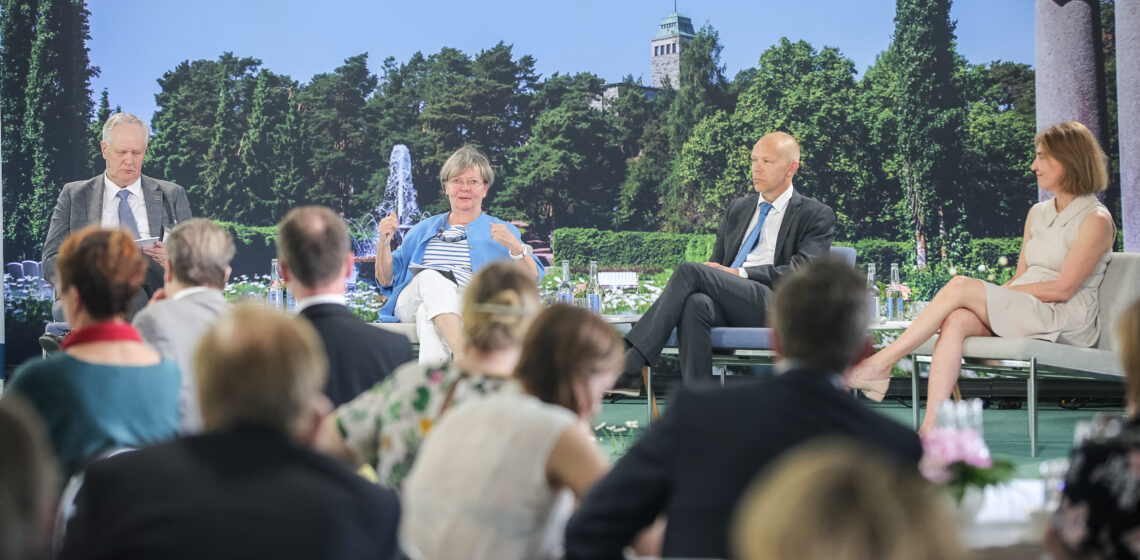The state and future of democracy was discussed at the concluding session of 2019 Kultaranta Talks with the topic “Politics in disruption – will democracy persist?” Moderated by Olli Seuri, journalist for the Finnish Broadcasting Company Yle, the discussion touched on issues such as populism, technology, economy and the political activity of young people.
According to Liisa Jaakonsaari, Chairperson of Atlantic Council of Finland, the old contrast between left and right is no longer valid. Instead, new contrast has emerged between conservative and liberal, nationalist and globalist. “Democracy will persist, but will values? And will the political system still work?” Jaakonsaari asked. Challengers “x-raying” old political parties are still a better option than the political system becoming paralysed.
Professor Anu Kantola said that politics usually surge back and forth, and now we are in a political riptide. The rise of populism started after the 2008 financial crisis. In Finland, party history has in general been characterised by the structural changes in economy and society. “We have a wide group of people with middle-class values who are trying to find the right party and also shopping around from one election to another. We are no longer members of the same party from cradle to grave.”
Minister Seppo Kääriäinen pointed out that a new regime often emerges as an alternative to the previous one. “People want something different. And that’s democracy, too.” “One could say that the republic has developed and proved to be alive this spring,” Kääriäinen said.
According to Heikki Aittokoski, Foreign News Reporter at Helsingin Sanomat daily newspaper, the world and economy are undergoing great changes, and it shows. “When we think how much has happened in technology alone in the last two or three decades, it’s no wonder there’s turbulence in politics as well,” Aittokoski said. “But for the most part in Europe, institutions are so stable that it’s blatant exaggeration to refer to the 1920s and 1930s.”
A critical citizen jammed by algorithms
Minister Jaakko Iloniemi and student Jussi Laatikainen took the floor highlighting the impact of the altorithms of new technology and social media giants.
Liisa Jaakonsaari called for rules for electronic media. While there are currently no rules, the EU is in the process of creating them. “Algorithms are trade secrets. It’s a grim outlook if they are given power in things like recruiting, granting bank loans or education”, Jaakonsaari said.
“Never before in the history of humankind has there been a situation where a handful of American business giants hold such a massive, global power,” Heikki Aittokoski pointed out. While he reckoned that “techclash” is on the rise and creating dystopias is trendy, he is still optimistic: democracy will persist. “For the most part, technology has improved our everyday lives.”
Anu Kantola also declared herself an optimist, even if, according to her, it is estimated that about 200,000 jobs will disappear in Finland with the advance of artificial intelligence. “Middle-class life has become more uncertain. In Finland, too, the middle class has started to disintegrate.” Kantola said that so far we have been able to build Finland together, but now it’s the time to check how to keep everyone on board.
“In a free society, a critical citizen is the cornerstone of democracy,” Seppo Kääriäinen emphasised. “But how do we ensure that we have critical Finns?” he asked.
“Ask us!”
The political activity of young people sparked off a lively discussion. The panellists believed that climate change mitigation will activate the young.
“Don’t talk about the young – ask them directly,” urged Heli Saarinen, Chairperson of UN Youth of Finland, taking the floor. Young people view politics in a phenomenon-based and cross-sectional manner. “Climate is absolutely the number one topic for us now and in future”, Saarinen said.
In his closing comments, President of the Republic Sauli Niinistö thanked all the participants. “People’s views have been realistically optimistic. It is an excellent starting point,” the President said.
He had observed that the working groups for the discussions had “people who were listening to each other. And what is more, they also seemed to hear each other.”
“My heartfelt thanks to all of you. This has been a thoroughly splendid discussion.”


